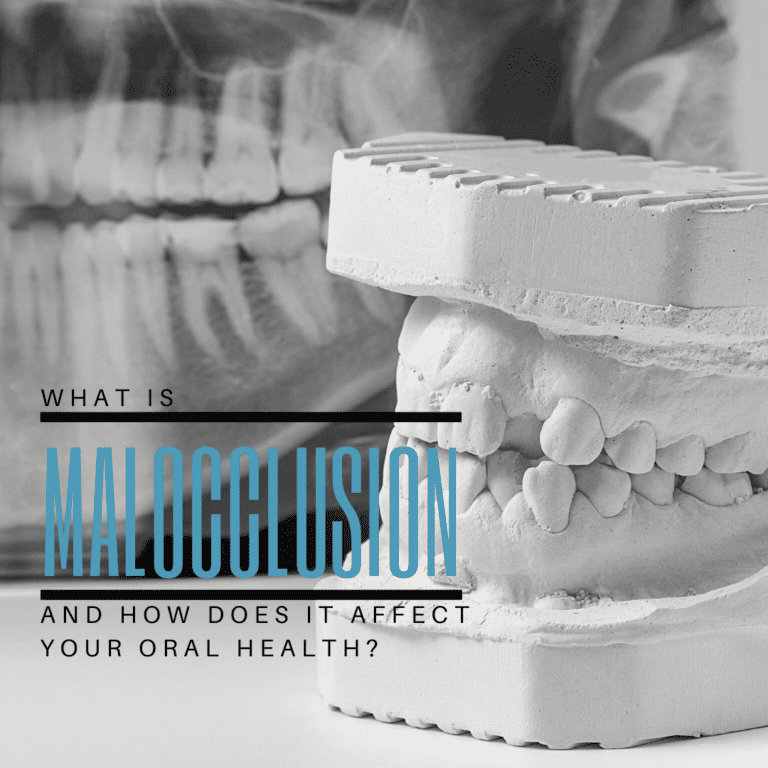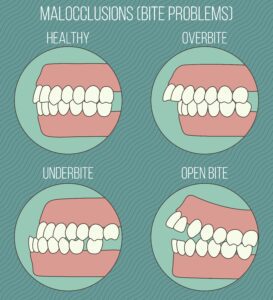What is Malocclusion and How Does it Affect Your Oral Health?

A beautiful smile is something that everyone wants. However, there are various dental conditions that can complicate having the perfect smile. Malocclusion is one such condition that can affect both the function and appearance of your teeth. A healthy mouth starts from the inside out – with your teeth. Since malocclusion directly affects your teeth, it can also affect your oral health. In this blog post we will discuss malocclusion and how it can affect your oral health.

Malocclusion is defined as the misalignment of teeth. There are several different types of malocclusion, but the basic types include underbite, overbite, and crossbite.
- Underbites are characterized by the lower jaw protruding farther out in front of the upper jaw.
- Overbites are characterized by the top teeth protruding too far over the bottom teeth.
- Crossbites are when the upper teeth overlap the lower teeth on one side of the mouth, but not the other.
In addition to types of malocclusion, your dentist will also diagnose malocclusion as being class I, II, or III. These different classes of malocclusion are as follows:
- Class I: This is the most common class and is characterized by upper and lower molars that are properly aligned, however the other teeth are too far apart or too close together.
- Class II: Possibly the result of a small jaw, class II is characterized by a severe overbite that causes the upper teeth to significantly overlap your lower teeth.
- Class III: Possibly the result of a larger jaw, class III is characterized by a severe underbite that causes your lower teeth to overlap the upper teeth.
Now that we have defined malocclusion, its types, and how it is diagnostically classified, let’s discuss how malocclusion affects oral health. While the exact effect of malocclusion tends to vary depending on the type and severity of the problem, here are some basic ways that malocclusion can affect oral health:
Increased Risk of Tooth Decay & Gum Disease
Tooth decay and gum disease are already the most common dental problems, even in people with perfectly aligned teeth. However, the risk for these dental problems is increased in individuals who are diagnosed with malocclusion. This is primarily because teeth that are not properly aligned are difficult to clean properly. Oftentimes, overlapping teeth have areas that are hard to reach, which means plaque and tartar tend to accumulated in these areas. Excess plaque and tartar buildup can cause tooth decay, as well as gum disease.
Worn Enamel
Another way that malocclusion affects oral health is by causing the enamel on your teeth to wear down prematurely. The enamel is the hard, outer layer of your teeth that protects them from decay and damage. When teeth are not properly aligned, they tend to rub against each other which can cause the enamel to wear down over time. This can lead to increased sensitivity to hot and cold foods and drinks, as well as an overall dulling of your teeth’s appearance. Worn teeth are also more likely to become damaged or decayed.
Jaw Problems
Malocclusion can affect the function of your jaw and lead to persistent headaches, earaches, neck pain, and other symptoms. Since malocclusion prevents teeth from properly meeting together in a way that allows for proper chewing motions, it is easy for muscles in your jaw to become strained or stiffen up when they are constantly having to work harder than they should. This can lead to long-term pain and discomfort in the jaw area.
Problems Biting and Chewing
Lastly, misaligned teeth can also lead to problems with biting and chewing. This is because when the teeth are not properly aligned, it can be difficult for them to function correctly together. This can cause pain in the jaw muscles and/or tendons, as well as headaches. Also the misalignment of teeth can cause problems with chewing and swallowing food that may lead to malnutrition or digestive problems.
Overall, malocclusion can have a significant impact on your oral health. If you are experiencing any of the problems listed above, it is important to consult with your dentist to see if you may be suffering from malocclusion and discuss treatment options.






Recent Comments